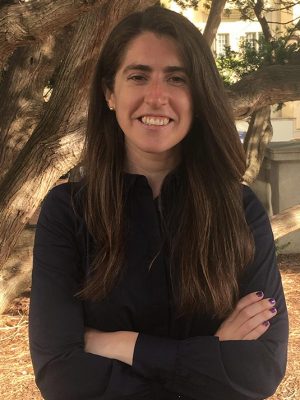
Patricia Hidalgo-Gonzalez
University of California, Berkeley
PhD Candidate
Patricia is a Ph.D. candidate at UC Berkeley advised by professors Claire Tomlin and Daniel Kammen. She obtained an M.S. from the Energy and Resources Group, UC Berkeley (2016). She graduated with highest honors as an Electrical and Industrial engineer from Pontificia Universidad Católica of Chile (PUC). She has been awarded the NSF GRFP, UC Berkeley GOP and the Outstanding Graduate Student Instructor Awards.
Her work focuses on high penetration of renewable energy using optimization, control theory and machine learning. Patricia co-developed the first stochastic power system expansion model to study the Western North America’s grid under climate change uncertainty. This work was funded by the California Energy Commission (CEC). She also works on frequency regulation with low and variable inertia. Her collaborations have included the CEC, LBNL, NREL, Energy & Environmental Economics, and NRDC.
Patricia is also passionate about teaching. She has worked as the head Graduate Student Instructor teaching Convex Optimization with professors Laurent El Ghaoui and Alex Bayen. After her undergrad studies, she worked as a Linear Algebra lecturer at PUC. Prior to being a lecturer she worked as a teaching assistant during three years for the same course. During her Ph.D. Patricia has mentored in different research projects more than 13 undergraduate and graduate students.
She served as Best Paper Session Judge for the session “Power System Stability, Phasor Measurements, Protection, and Control” at the 2019 IEEE Power & Energy Society General Meeting (PESGM). Patricia also serves as an IEEE reviewer for the Transactions on Power Systems journal, Conference on Decision and Control, American Control Conference, and PESGM.
Research Abstract:
I have placed myself as a front runner in three areas: modeling of power systems with high penetration of Renewable Energy Sources (RES), optimization and control theory for power dynamics, and informing energy policy.
As more non-synchronous RES participate in power systems, the system’s inertia decreases and becomes time dependent, challenging frequency stability. Until now, power dynamics have been modeled as time-invariant. We propose a new modeling framework for power system dynamics to simulate a time-varying evolution of rotational inertia coefficients in a network. We model dynamics as a switched affine hybrid system with discrete modes representing different rotational inertia regimes of the network. Using this, we study how to control frequency in a network by learning a controller and then reducing communication between control agents.
We developed the first climate change stochastic long-term capacity expansion and operation electricity grid model for the Western Electricity Coordinating Council (WECC), with high temporal and spatial resolution. The Stochastic SWITCH WECC model generates a least cost portfolio of power plants that is robust to different future climate change conditions. This work revealed, among other findings, the importance of expanding and coordinating transmission lines between California and its neighboring states.
In my work on optimization and control theory for power dynamics, I have further developed the area of data-driven design of stable controllers. In future work, I plan to develop a mathematical framework to design sparse controllers via learning while at the same time guaranteeing stability. I also plan to continue pushing the frontiers in RES integration and policy.